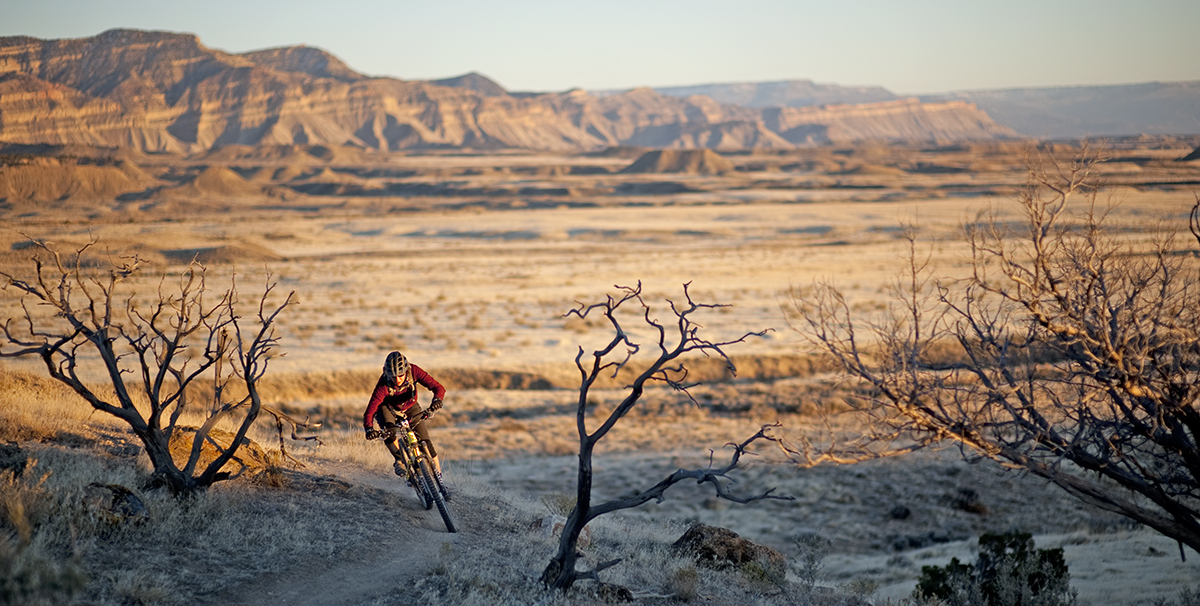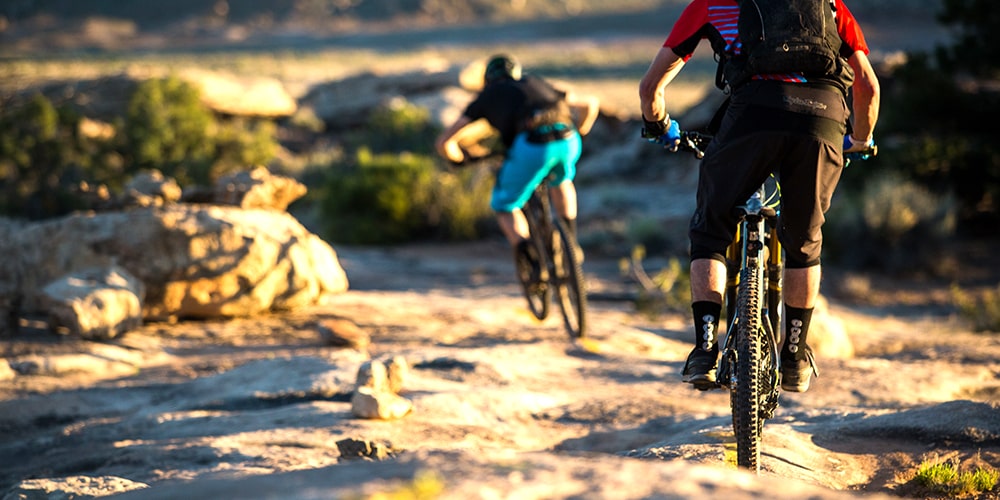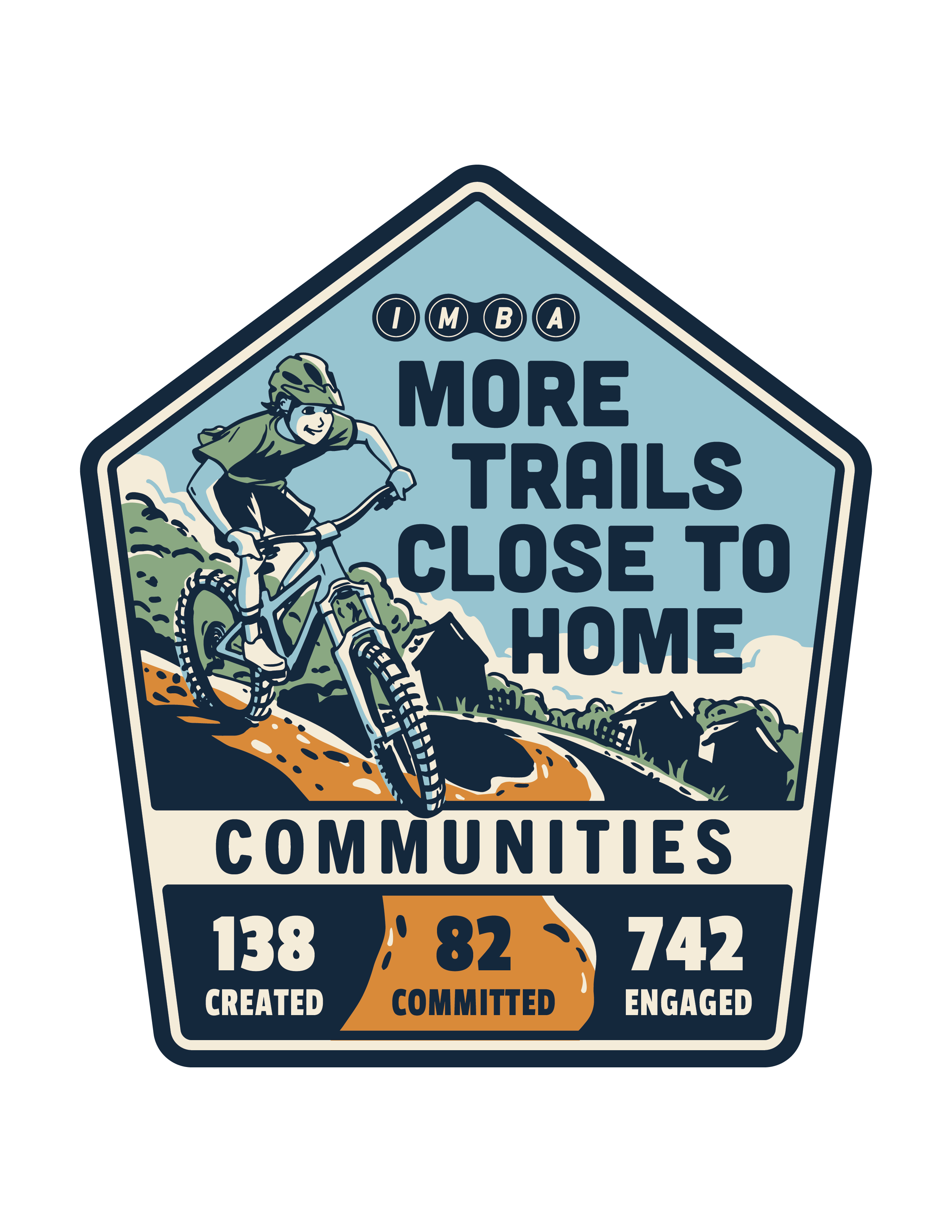2017 was an impressive year for our small-but-mighty advocacy team. Aaron and Eric, supported by other staff, lent their expertise and time to national and local efforts across the country. As a result, bike access was both maintained and restored, and new opportunities for even more riding opened up.
IMBA was founded in 1988 by a group of California mountain bike clubs concerned about the closure of trails to bicyclists. Those pioneers believed that the development and promotion of mountain biker education programs and innovative trail management solutions were the key to gaining and maintaining access. The threats have evolved but IMBA’s focus on opportunities for riders has remained steadfast. We still believe that education, collaboration and innovation are the keys to gaining and maintaining mountain bike access to trails, as well as developing new riding opportunities.
Here's just a snapshot of what we accomplished last year in the advocacy and policy realm:
$80,000 directed to trails, USA
In 2017, IMBA helped pass the National Forest Trails Stewardship Act (HR 845) which provides opportunities for volunteers and partners to carry out trail maintenance in each region of the US Forest Service. The act addresses the barriers to increased volunteerism and partnerships, and prioritizes increased volunteerism and partnerships in Forest Service regions with the most severe trail maintenance needs. As a direct result of HR845, IMBA staff were able to sit on a committee that helped award $80,000 in grants to mountain bike trail projects across the country.
Maintaining access to National Monuments, USA
During IMBA’s Defend National Monuments campaign, our members and supporters submitted more than 5,000 letters to the Dept. of the Interior supporting National Monuments as an important tool that conserves lands while also providing for mountain bike access. THANK YOU! While we're concerned with the reductions of some monuments, IMBA supporters have successfully helped to defend the four that mountain bikers were advocating for. Thanks to our combined efforts, we still have access to Canyons of Tthe Ancients (CO), Katahdin Woods and Waters (ME), Berryessa Snow Mountain (CA) and San Gabriel Mountains (CA).
Memorandum of Understanding and operating plan with the Bureau of Land Management Colorado state office
In many of the Western states, the Bureau of Land Management (BLM) has consistently been a great partner to mountain bikers. Ensuring an effective partnership requires a robust agreement of what the joint priorities are. In Colorado, IMBA worked with the BLM to update and sign a new MOU and created the most detailed and interactive operating plan to date. We did this via a democratic process by reaching out to all mountain bike groups around the state and hosting a group meeting to discuss the value of the MOU. We also collected mountain bike projects for the upcoming year that are on BLM lands and got them into the local operating plan. In fact, the Washington, D.C. office took note of this plan and used it as an example across the agency. Success begets success! The BLM oversees more than 4 million acres of public land in Colorado. Collectively, we are bringing the Colorado mountain bike community together to ensure we maintain a strong and effective relationship with the state’s BLM land managers.
Saving singletrack in Durango, Colorado
IMBA and Trails 2000, a group in southwest Colorado, have engaged in a decade-long effort to protect both the Hermosa Creek Watershed and the iconic trails within it: Hermosa Creek, the Colorado Trail, and the lift-served trails at Purgatory Ski Area. IMBA and Trails 2000 helped protect the land in a Special Management Area through legislation passed in 2014. Recently, the US Forest Service proposed a six-month seasonal closure for mountain bikes on the trails in that area. While closures had some legitimate wildlife and resource concerns, they were applied with a broad brush due to anti-bike advocates and state managers.
Together, IMBA and Trails 2000 embarked upon an aggressive negotiation strategy, including engaging both the area’s U.S. Senator and Congressman in defending mountain bike access. In December 2017, exactly three years after passing the original bill, the Forest Service accepted our coalition recommendations, saving mountain bike access in this special corner of southwest Colorado. This effort was an amazing example of what can be done when a top-notch professional, local advocate (Trails 2000’s executive director) leads an advocacy effort while leveraging the experience and connections of IMBA’s national team.
Nantahala-Pisgah Agreement, North Carolina
IMBA/SORBA is one of many members taking part in two collaborative groups: the Nantahala-Pisgah Forest Partnership and the Stakeholders Forum. They are working on securing bike access through recommendations for the Nantahala and Pisgah Plan Revision. This years-long project holds the potential to change the way millions of people use the two forests, in which recreation supports a growing economy that has spread across the mountains of Western North Carolina. IMBA/SORBA entered into an historic agreement with 40 organizations and recreation-related businesses recommending over 160,000 acres of National Recreation Areas for the Nantahala-Pisgah National Forest, preserving the land AND access to mountain bike trails in this iconic riding destination.
Restoring access in the Allegheny Recreation Area, Pennsylvania
IMBA’s advocacy team supported our chapters Northern Allegheny Mountain Bike Association and Western New York Mountain Bike Association in successfully advocating to open 12.5 miles of trail previously closed to bikes in the Allegheny Recreation Area in Northwest Pennsylvania. Strong relationships with the US Forest Service—thanks to local mountain biker advocacy, professionalism and dedicated volunteers—played a major role in the proposal to reopen a trail that was closed to bikers in 1994. NAMBA and WNYMBA expect these trails in Tracy Ridge to be open soon, after the Forest Service issues its final decision.
Forest planning: Inyo, Sierra, Sequoia National Forests, California
National forest plans are important for mountain bikers to pay attention to because they set the overall management direction and guidance for the forests. The plans are revised only once every 20 years and, among other things, can lead to future Wilderness recommendations and where mountain bike access is and is not allowed. Organizing around one forest plan is challenging enough; covering three simultaneously is monumental. IMBA’s advocacy team worked closely with IMBA chapter members to actively participate in the multi-year U.S. Forest Service Forest Plan revision process on the Sierra, Sequoia and Inyo National Forests, an area covering 4.4 million acres. Chapters and members were engaged at every step in the process, and were successful in generating well-informed comments and influencing this planning process in favor of mountain bike opportunities and continued trail access.
Recreation Not Red Tape Act, USA
The Recreation-Not-Red-Tape Act (RNRT) is bipartisan, federal legislation that seeks to enhance recreational opportunities on public lands and make it easier for Americans to get out and do so. IMBA has worked on and enthusiastically supports RNRT because it aims to improve mountain biking and outdoor recreation access on our public lands, as well as grow the outdoor economy.
Mountain bikers, especially local advocates and trail builders, can get excited about these five components of the RNRT Act:
- The act establishes National Recreation Areas (NRAs) as a more uniform system of designations with a specific inventory and recommendation process. IMBA supports NRAs as a viable, bike-friendly land protection designation. The expansion of NRAs means potential for more places to ride.
- The act directs federal agencies to develop a Volunteer Enhancement Initiative to encourage and promote greater volunteerism. This will help IMBA Chapters and mountain bike groups better engage with those agencies to maintain trails and help address the severe federal trail maintenance backlog.
- The act expands recreation opportunities by identifying highly seasonal locations and building new recreation assets at those locations. For example, some ski areas on public land sit idle in the summer and some lakes only provide water-based recreation, yet both have prime land for trails. We could see new trails in exciting, new places.
- The act requires all federal agencies like the Bureau of Land Management and US Forest Service to coordinate uniform management of trails that cross agency boundaries. This will lead to more well-maintained trails and more opportunities for long-distance routes.
- The act ads “recreation” to the missions of more federal land management agencies including the U.S. Army Corps of Engineers and Bureau of Reclamation. This new mission focus could lead to increased partnerships with these agencies and new trail development opportunities.





